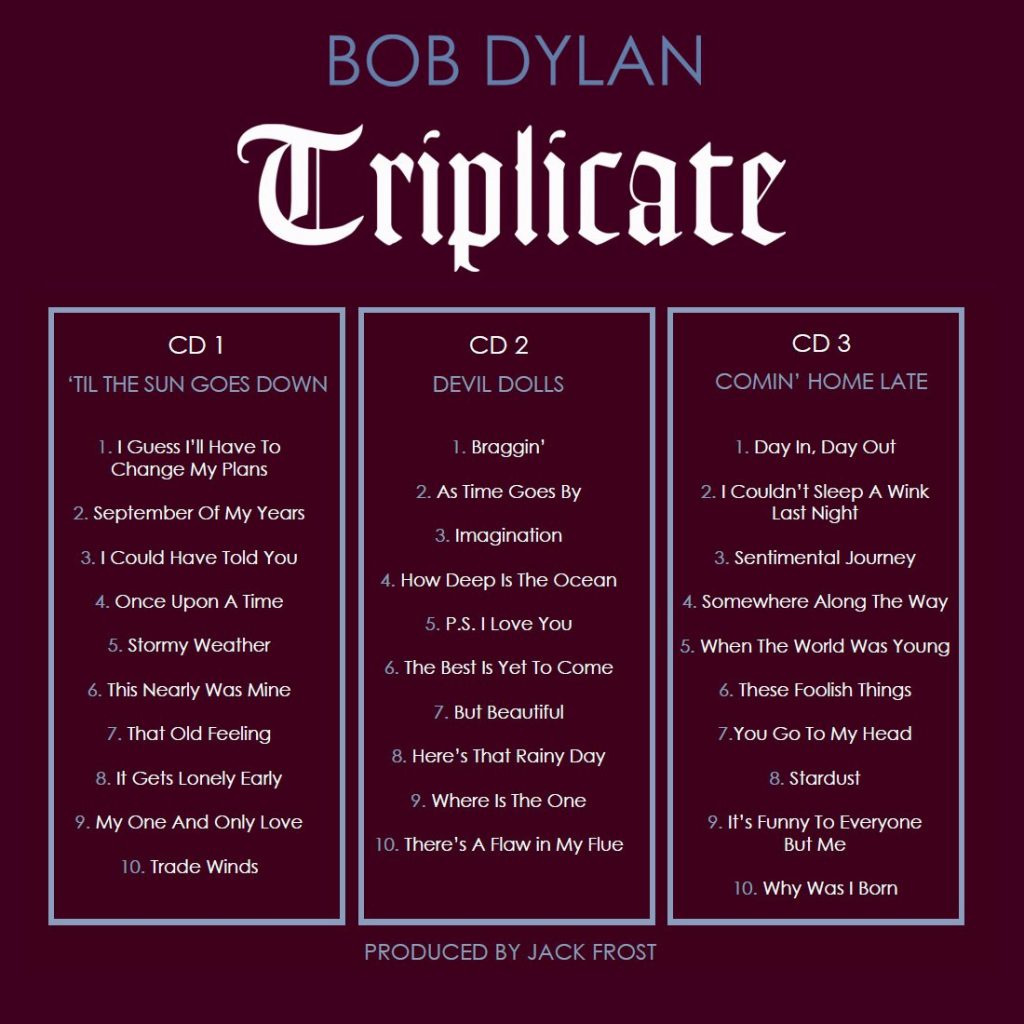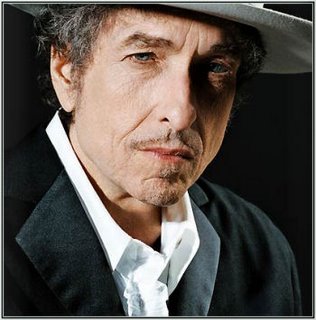A three-disc studio album from Nobel Prize-winning rock poet Bob Dylan called “Triplicate” will be released by Columbia Records on March 31, 2017, featuring 30 brand-new recordings of classic American tunes from the pre-rock era and marking the first triple-length set of the artist’s illustrious career. While it’s been almost five years since Dylan has released an album of new songs – “Tempest” in September 2012 – and while some – including this writer – may not exactly be jumping up and down with excitement about another Dylan “covers” album of pre-rock pop (following 2015’s “Shadows in the Night” and last year’s “Fallen Angels”), there are some reasons to look forward to the set.
For one, the first single, “I Could Have Told You,” has been released, and Dylan’s voice sounds better than it has than on previous recordings. While there’s still a growl that can be heard at the bottom of his voice, Dylan exercises more control of the melody and keeps the growl mostly at bay. The song was written by Carl Sigman and Jimmy Van Heusen and is most often associated with Frank Sinatra.
Secondly, last year’s concert tour, in which Dylan alternated the pre-rock covers with his own songs, made clear that he is carefully selecting songs and reinterpreting them to show how much of his own work fits logically in the context of early-to-mid 20th century American pop music – what is often called “standards” – mostly written by immigrant Jewish songwriters, for whom Dylan-as-singer clearly has great sympathy.
According to Columbia Records, each disc in the new set will be individually titled and presented in a thematically arranged 10-song sequence. The three themes are: “’Til the Sun Goes Down,” “Devil Dolls,” and “Comin’ Home Late.”
The song titles themselves are very suggestive and indicate that Dylan may be telling a story through them. The final song of the set, “Why Was I Born?” — written by Jerome Kern and Oscar Hammerstein II and previously recorded mostly be female singers, including Dorothy Lamour, Margaret Whiting, Ella Fitzgerald, and Billie Holiday — asks the same question that Dylan has asked in several of his own songs (and in interviews) over the course of time.
 The set kicks off with Arthur Schwartz and Howard Dietz’s “I Guess I’ll Have to Change My Plans,” written in 1929 right around the beginning of the Great Depression, and recorded variously by Clifton Webb, Fred Astaire, Frank Sinatra, Tony Bennett, and Julie London.
The set kicks off with Arthur Schwartz and Howard Dietz’s “I Guess I’ll Have to Change My Plans,” written in 1929 right around the beginning of the Great Depression, and recorded variously by Clifton Webb, Fred Astaire, Frank Sinatra, Tony Bennett, and Julie London.
Other songwriters represented include Charles Strouse and Lee Adams (“Once Upon A Time”), Harold Arlen and Ted Koehler (“Stormy Weather”), Harold Hupfield (“As Time Goes By”) and Cy Coleman and Carolyn Leigh (“The Best Is Yet To Come”).
The album is the 38th studio set from Dylan and is credited to the producer Jack Frost, a pseudonym that Bob Dylan has used as producer since the 1990s.
“Triplicate” will be simultaneously released in several configurations, including a 3-CD 8-Panel Digipak, a 3-LP vinyl set and a 3-LP Deluxe Vinyl Limited Edition packaged in a numbered case. “Triplicate” is also available for pre-order on iTunes, and one of its recordings, “I Could Have Told You,” can now be streamed via a “Vinyl Video” on YouTube. All physical products are also available for pre-order in the bobdylan.com store.
The artist’s two previous albums of classic American songs, last year’s “Fallen Angels: and 2015’s “Shadows in the Night,” were both worldwide hits and garnered Grammy Award nominations in the category of Best Traditional Pop Vocal Album. “Fallen Angels” achieved Top Ten debuts in more than a dozen countries, including the United Kingdom, the United States, Italy, The Netherlands and Austria, while “Shadows in the Night” debuted in the Top 10 in seventeen countries, with #1 debuts in the United Kingdom, Ireland, Sweden and Norway.
Bob Dylan’s seven previous studio albums have been universally hailed as among the best of his storied career, achieving new levels of commercial success and critical acclaim for the artist. The platinum-selling “Time Out of Mind” from 1997 earned multiple Grammy Awards, including Album of the Year, while “Love and Theft” continued Dylan’s platinum streak and earned several Grammy nominations and a statue for Best Contemporary Folk album.
 “Modern Times,” released in 2006, became one of the artist’s most popular albums, selling more than 2.5 million copies worldwide and earning Dylan two more Grammys. “Together Through Life” became the artist’s first album to debut at #1 in both the U.S. and the UK, as well as in five other countries, on its way to surpassing sales of one million copies. “Tempest” received unanimous worldwide critical acclaim upon release and reached the Top 5 in 14 countries, while “Shadows in the Night” and “Fallen Angels” were hailed by fans and lauded by critics for Dylan’s singular interpretive artistry.
“Modern Times,” released in 2006, became one of the artist’s most popular albums, selling more than 2.5 million copies worldwide and earning Dylan two more Grammys. “Together Through Life” became the artist’s first album to debut at #1 in both the U.S. and the UK, as well as in five other countries, on its way to surpassing sales of one million copies. “Tempest” received unanimous worldwide critical acclaim upon release and reached the Top 5 in 14 countries, while “Shadows in the Night” and “Fallen Angels” were hailed by fans and lauded by critics for Dylan’s singular interpretive artistry.
These seven releases fell within a 19-year creative span that also included the recording of an Oscar- and Golden Globe-winning composition, “Things Have Changed,” from the film “Wonder Boys,” in 2001; a worldwide best-selling memoir, “Chronicles Vol. 1,” which spent 19 weeks on the New York Times Best Seller List, in 2004, and a Martin Scorsese-directed documentary, “No Direction Home,” in 2005. Bob Dylan also released his first collection of holiday standards, “Christmas in the Heart,” in 2009, with all of the artist’s royalties from that album being donated to hunger charities around the world.
In December 2016, Bob Dylan was awarded the Nobel Prize for Literature by the Swedish Academy “for having created new poetic expressions within the great American song tradition.” He was a 2012 recipient of the Presidential Medal of Freedom, the United States’ highest civilian honor, and was awarded a special Pulitzer Prize in 2008 for “his profound impact on popular music and American culture, marked by lyrical compositions of extraordinary poetic power.” He was also the recipient of the Officier de la Legion d’honneur in 2013, Sweden’s Polar Music Award in 2000, Doctorates from the University of St. Andrews and Princeton University, as well as numerous other honors.
Bob Dylan has sold more than 125 million records around the world.

